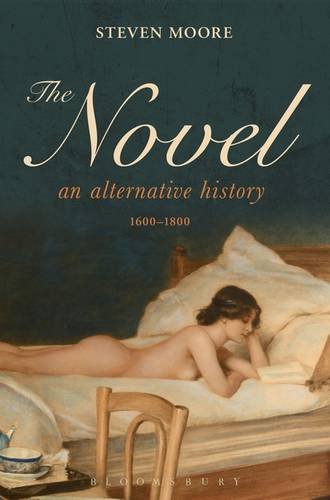
Rick Robinson is curious about the Big Fat Books I’ve been reading this summer. Here’s the first one: Steven Moore’s The Novel weighs in at 1,013 pages! Steven Moore seemingly has read everything. After finishing The Novel I had a list of books as long as your arm that I want to read. The years 1600-1800 cover a lot of ground, but I found Moore a dependable guide through the thicket of books. If you’re remotely interested in the development of the novel, you’ll find The Novel full of history and surprises. If Steven Moore brings out another volume of The Novel (perhaps 1800-1900), I’ll buy it and read it. Steven Moore’s first book in this series, The Novel: An Alternative History, Beginnings to 1600 (2010) was a mere 704 pages. GRADE: A
I’d buy it just for the cover!
Dan, I have to admit the cover is eye-catching. The cover on the first volume is dandy, too!
Dan-
Do you know the name of the cover artist?
Ray
Ray, the cover is DER BUCHERWURM (THE BOOKWORM) BY HERMANN FENNER-BEHMER (1866-1913).
Yikes. I wonder if I’d get through half of it.
Bill, instead of pumping iron, you could just carry THE NOVEL around with you! It’s as thick as a brick!
There was a time when I read these big non fiction books (well, maybe not this big) but I’m afraid I have a shorter attention span (and the internet!) now.
And stay off my lawn!
Jeff, I confess I had to take some “breaks” from THE NOVEL and read some short stories and essays. But, THE NOVEL is encyclopedic and comprehensive. And, there’s that cover…
It sounds great but I know it would take me at least three months to read. And I feel like that’s too long for any one book for me. Give us the list of books you made. Interested to see that.
Patti: I’ll try to find that list. Diane’s sister is visiting this week and I had to stash my books and lists to make room for her. But here’s the Table of Contents for THE NOVEL:
Preface
Chapter 1: The Early Modern European Novel
Spanish
German
Latin
Chapter 2: The Early Modern French Novel
Chapter 3: The Early Modern English Novel
Chapter 4: The Early Modern Eastern Novel
Chinese
Korean
Japanese
Tibetan
Persian
Indian
Chapter 5: The Early Modern American Novel
Bibliography
Chronological Index of Novels Discussed
General Index
Wow! And I grouse around when I have a book longer than 400 pages.
Waaay over my head, even if I skipped all but the English & American novel chapters. George, I liked your Jethro Tull reference in the comment to Bill.
Beth, I can only tackle 1000-page books in the Summer. I have a few more Big Fat Books to review before the Summer is over.
Rick, I thought you might appreciate that Jethro Tull reference.
The cover, the cover! Who cares about novels? I want to know who painted the cover (as I do about any book with a striking cover, new or old, hard or soft). Please have a look at the fine print on the boilerplate page, or maybe on the dust jacket flap, and let us know who did it. Also his other book with the redhead. Thanks!
Art, the cover is credited this way: “Cover image, DER BUCHERWURM ( The Bookworm), 1906, by Hermann Fenner-Behmer (1866-1913) copyright Meseum Europaeischer Kuulturen, Staatliche Meseen, Berlin, Germany.”
Thanks, George. Lots of Google images for F-B, mostly academic, nudes mostly classic/mythological, a strong Bouguereau influence or kinship. – this one is a delightful departure. Time to go look and see if there are frameable prints out there.
Art, the redhead on the cover of THE NOVEL: BEGINNINGS to 1600 was painted by Jean-Jacques Henner (1829-1905): LA LISEUSE, ca. (1880/90), oil on canvas.
“Thick as a brick” (along with its corollary, “Thick as two planks”) is an old English expression to describe a dim-witted person. Jethro Tull may have used it, but I grew up hearing my Cockney mother use it–and that predates Jethro Tull by a few decades.
/It helps if you imagine “thick” being pronounced “fick.” Oh, I can hear my mother now!
Deb, I knew the term went back much further, but assumed George’s use was the popular music one. Yes, the Tull use is also someone who is extremely dense.
George, if I may… I review Moore’s book here —
http://musicandliterature.org/2013/08/26/the-novel-an-alternative-history-1600-1800/
— and mention a few authors (german, french, american and chinese) Moore appreciates. Perhaps some of your readers might find that useful.
Jeff
Sounds good, Jeff.